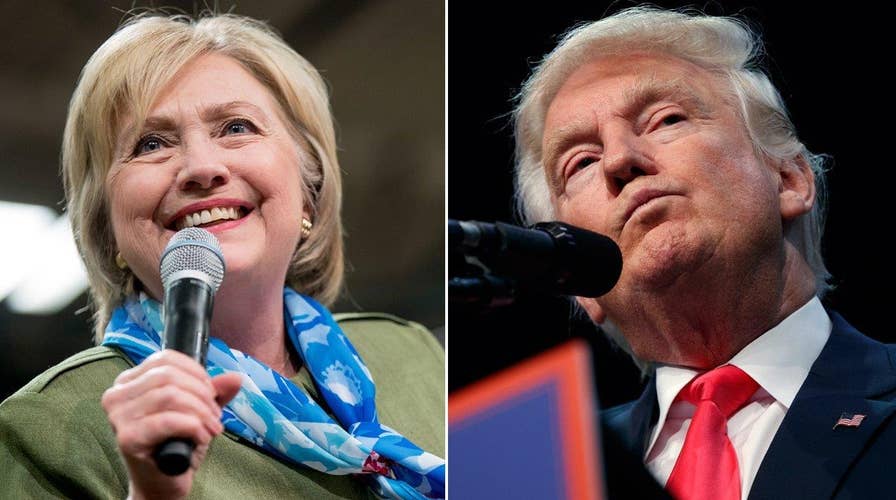Only one candidate can win the U.S. presidency, but Donald Trump and Hillary Clinton’s teams are already creating the framework for an administration prepared for the White House on Day One.
Trump and Clinton opened formal transition offices on Monday in the same Pennsylvania Avenue building close to the White House, accommodations funded by taxpayers as part of $13 million Congress appropriated for pre-election planning.
"If you aren't preparing, then the American public should be concerned about whether you're fit to lead," said Partnership for Public Service CEO Max Stier, who is helping both campaigns with transition planning through the non-profit's Center for Presidential Transition. "The point of maximum vulnerability is when there is that handoff of power."
Stier and others close to the process insist that building a transition team -- which will draft detailed policy agendas and help hire hundreds, then thousands of administration staffers -- is not merely a pro forma exercise, with matters of national and economic security at stake.
“What if 9-11 happens,” Clay Johnson, who led the 2002 Bush-Cheney transition team, recently told FoxNews.com. “There has to be a total willingness and a desire that says, ‘Let’s do this for America.’ ”
Johnson -- who was George W. Bush’s chief of staff when Bush was governor of Texas -- acknowledged that a presidential candidate might think that assembling a transition team will jinx his or her White House bid.
“Yeah, it’s a little like measuring the drapes,” said Johnson, now a member of the center’s advisory board. “But you have to have presumptions because if not you could be elected president and not prepared.”
The White House recently announced that Trump, the Republican presidential nominee, and Clinton, the Democratic nominee, are now eligible to receive intelligence briefings from the government.
Clinton, a former first lady and secretary of state, just announced that long-time adviser and campaign chairman John Podesta and aide Minyon Moore will lead the nonprofit Clinton-Kaine Transition Fund but has not said who will lead the effort through the center.
Trump, a first-time candidate, has picked former GOP primary rival and New Jersey Gov. Chris Christie to lead his team.
Trump's son-in-law, Jared Kushner, a real estate developer, is also playing an active role along with Jamie Burke, who played a senior role in Mitt Romney's transition team four years ago.
Trump's team has identified experts in major policy areas such as foreign affairs, national security and economic affairs to help build out the transition, but those familiar with preparations to date describe them as preliminary at best.
A Trump spokeswoman did not respond to repeated questions by the Associated Press about transition planning. And Christie declined an interview, through a staffer.
Third-party candidates essentially must have 15 percent of the vote in multiple polls to receive Government Services Administration support.
Romney's 2012 team, dubbed the Romney Readiness Project, had 495 people working for the transition effort before Election Day and another 165 identified to join had he won the election, according to Stier's office.
Ahead of the 2009 presidential inauguration, the Obama-Biden Transition Project had more than 600 staff dedicated to the transition.
Trump's transition has only a handful of staff so far and his entire campaign listed only about 70 people on the payroll and another few dozen consultants at the end of June, according to Federal Election Commission filings.
The goal is to create "a miniature federal government," said former Utah Gov. Michael Leavitt, who led Romney's transition team four years ago and is informally advising Trump.
There are just 73 days between the Nov. 8 election and the Jan. 20, 2017 inauguration when the new presidential takes over. Without a running start, Leavitt says that's simply not enough time to appoint roughly 4,000 personnel that occupy senior roles in government departments -- State, Defense, Homeland Security, Commerce, and Treasury among them - many requiring multiple security reviews or Senate confirmation.
Leavitt also argued that the nation is often most vulnerable during periods of transition. The 1993 siege in Waco, Texas, the Sept. 11, 2001 terrorist attacks and the 2008 economic meltdown all occurred within months of a new president taking over.
Stier told FoxNews.com that hiring “the right talent” from such diverse fields as business, academia and nonprofits is just the start of the transition process, with providing good leadership and a system in which new hires can thrive being of equal importance.
The Associated Press contributed to this report.













































